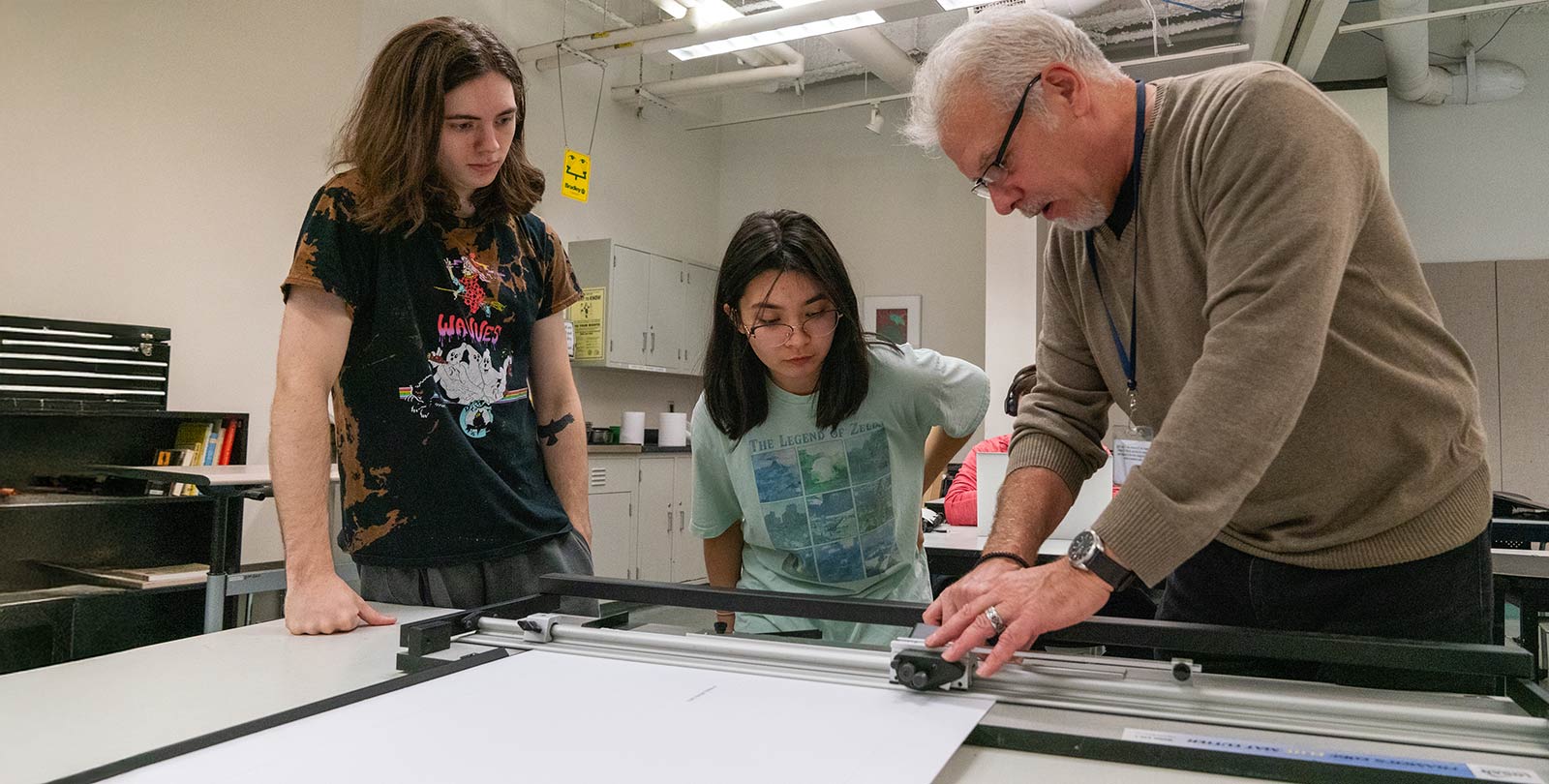What You Will Learn
The Industrial Design track offers a diverse and interdisciplinary studio environment whereby students gain insight to multiple areas of design and their influences within industry, society and profession. Architecture, Interior Design, Industrial Design, Fashion Design, Fashion Merchandising are areas that make up the studio culture in the Design Program at CCM.
The Industrial Design track provides a comprehensive foundation for students transferring to four-year colleges and universities to continue their studies and pursue a Bachelor of Industrial Design (B.I.D.), Bachelor of Science (B.S.) or a Bachelor of Fine Arts (BFA) in Industrial Design. Contemporary and traditional skill-sets acquired at CCM provide the student with immediate opportunities in industry as CAD Designers, Industrial Design Assistants or Interns, Production Assistants and Manufacturing Assistants.
Curriculum
Our Industrial Design program features a combination of a 30-credit design core and ten credits towards the industrial design track.
Core courses include History of Design, Drawing, 2D For Designers, 3D Design, Color Theory, Design Concepts, Design Rendering and a final Portfolio Preparation course enabling you to have your work presentable for professional job applications or future educational goals. The track focuses on CAD and Drafting courses. This is in addition to the 20-credit general education foundation for all design majors at CCM.
Careers in the Field
A degree in Industrial Design will prepare you for the following careers:
Associate Degree:
- CAD modeler/designer/drafter
- Industrial design assistant/intern
- Materials and manufacturing assistant
- Production assistant
- Solidworks modeler
Bachelor’s Degree:
- Accessories designer
- Automobile designer
- Bicycle designer
- Car body designer
- Ceramic designer
- Ceramic mold designer
- Ergonomic designer
- Footwear designer
- Furniture designer
- Industrial designer
- Package designer
- Rug designer
- Snowboard designer
- Sustainable designer
- Tableware designer
- Textile designer
- Tile designer
- Toy designer
- Universal designer
Why Study Industrial Design at CCM?
CCM has designated studio classrooms with state-of-the-art equipment and software available to all design students.
- The class size average is 12:1 in the studio; this ratio fosters a mentoring relationship between the student and professor.
- Studios are supplied with materials and resources that allow extensive opportunities for creative exploration in research and process.
- Faculty are dedicated and highly accomplished. Many maintain professional practice, bringing real-world problems to the design curriculum and classroom.
The program is accredited by the Middle States Association of Colleges and Schools.
Where You Can Go
Upon completion of the Associate in Fine Arts (AFA), the majority of Industrial Design track students at CCM transfer to earn a bachelor’s degree: Bachelor of Industrial Design (B.I.D.), Bachelor of Fine Arts (BFA) or Bachelor of Science (B.S.). CCM graduates have transferred to the following institutions based on their CCM grade point average and portfolio:
- Academy of Art University
- Art Center College of Design
- Fashion Institute of Technology (FIT)
- Thomas Jefferson University
- Kean University
- Montclair University
- New Jersey Institute of Technology (NJIT)
- Otis College of Art and Design
- Parsons School of Design
- Pratt Institute
- Savannah College of Art and Design (SCAD)
Students uncertain about their career goals or preference of Design discipline are offered opportunity for exploration within this program. Visit our Transfer Services page for more information.
Credit, non-credit internship experiences and job search support are facilitated through our Office of Career and Transfer Services, where you can also learn how to build a resume, and receive the tools to help you with interviewing skills to succeed! Learn more about Career Services here.
Paying For Your Industrial Design Education
Earning an associate degree in design is a powerful investment that will pay off over the course of your life, in both increased earnings and job satisfaction. But what is the upfront cost, and how do you afford it?
There’s good news: Money is available to help you pay for school! Our Financial Aid staff can provide lots of information about the process of finding funds to help pay for your education.
Featured Courses
Computer-Aided Drafting (CAD) I and II
This two-semester course is an introduction to the concepts and operation of engineering drawing preparation using computer-aided drafting (CAD). The emphasis is on how CAD can reduce drawing time and improve accuracy. Students learn to use the AutoCAD software program to prepare drawings. Additional topics include prototype drawings, blocks, attributes, x-reference, grips, paper space and development of 3-dimensional solid modeling.
2D for Designers
A studio course that explores a variety of techniques of visualization to develop and present design concepts. Students learn to use elements and principles to achieve a synthesis of form, space, composition, and content. Emphasis will be given on communicating ideas for realization as architectural and interior spaces, consumer products, packaging, and fashion design. The course is designed to address the range of formal issues, processes, and material practices students will encounter as they move into the more specialized areas of design.
Design Concepts I
A detailed exploration of scale and proportion through two and three-dimensional sketch problems varying in levels of complexity and duration. Design projects explore relationships between historical and cultural systems and human proportion. Verbal and graphic communication skills are emphasized as a method of articulating the development of visual concepts and solutions to design problems. Communication tools such as perspective are explored in detail. Projects, which include architectural, interior design, fashion and industrial design are reviewed through juried presentations.





